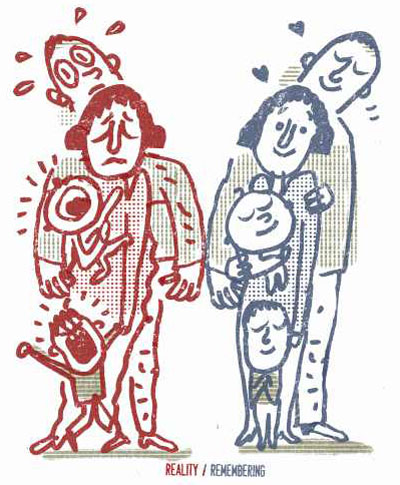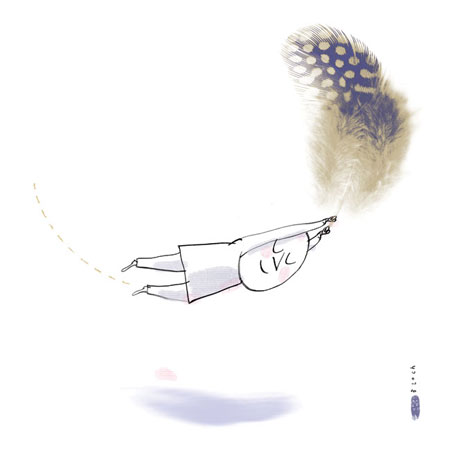The Parenting Paradox

In an evening dads’ class in St. Paul, a fellow named Paul Archambeau has the floor. He’s different from the other fathers in the room. While most are first-time dads — or have, say, a 3-year-old and a newborn — Paul has four children. His youngest is 3, his oldest is 11. “Now that Ben and Isaac are growing up,” he says, “I long for the days when they would sit at the counter and eat Cheerios with their hands. Norah” — his youngest — “can drive me crazy with some of the things she does. But I just know, a year or two or three from now, I’m going to say, ‘Man, that was fun.’” Another father, Chris, whose son is 17 months, looks surprised. “Why do you long for that?” he asks. “Because
I see being able to play catch …”
Says another: “Yeah, I fight the feeling off every day — I can’t wait until he’s older.”
“I don’t know,” Paul admits. “Maybe the finality to it, knowing I’m never going to get those years back. Or maybe because I’m forgetting how hard it was.”
The group debates this for a while.
“But here’s the thing,” says Paul. “I would bet that if someone did a study and asked, ‘OK, your kid’s 3, rank these aspects of your life in terms of enjoyment,’ and then, five years later, asked, ‘Tell me what your life was like when your kid was 3,’ you’d have totally different responses.”
With this simple observation, Paul has stumbled onto one of the biggest paradoxes in the research on human affect: We enshrine things in memory very differently from how we experience them in real time. The psychologist Daniel Kahneman has coined a couple of terms to make the distinction. He talks about the “experiencing self” versus the “remembering self.”
To read the entire article from this and other issues, subscribe to The Saturday Evening Post.
Simple: Less Is More

IN1980, the typical credit card contract was about a page and a half long. Today it is 31 pages. The consequence is that people no longer read these agreements, then find their accounts canceled or subject to high interest rates. Here are some examples of the mess we’ve gotten into thanks to the crisis of complexity:
- Landline phone customers paid more than $2 billion a year for unauthorized charges, according to 2011 FCC estimates, largely because the bills are so confusing that most customers “never realized they were being charged.” Of course they didn’t realize it. What is the difference between “Basic,” “Regional,” “Non-Basic,” and “All Other” charges? Not to mention that there are 11 separate taxes, fees, and “other charges” that amount to almost 50 percent of a typical wireless phone bill.
- Homeowners spend an average of $868 per year for homeowner’s insurance without understanding what they’ve bought. A 2007 National Association of Insurance Commissioners survey revealed that one-third to one-half of insurance policyholders were misinformed about what perils are covered and how much they might receive if they made a claim. The study included 673 respondents interviewed by phone with a margin of error of 3.8 percent at a 95 percent level of confidence.
- Marquis Dunson died in 2002 after his parents gave the one-year-old Infants’ Tylenol for three days to treat his cold symptoms. In the subsequent lawsuit, which resulted in a $5 million award, the plaintiffs argued that the warning labels and directions on the Infants’ Tylenol label did not make clear that an overdose of acetaminophen, Tylenol’s active ingredient, could lead to liver failure. The FDA estimates that an average of 458 deaths each year are due to acetaminophen overdoses.
- Southern Medical Journal published a study that estimated a dermatologist signs his or her name 29,376 times a year. Can someone do anything 30,000 times a year with focus and certainty?
- The United States was founded and governed for over two centuries on the basis of a document that is six pages long. That is 0.1 percent of the length of the current income tax code, which currently runs a whopping 14,000 pages.
- Over 425,000 apps in the Apple iPhone App Store.
- 241 selections on the Cheesecake Factory menu, not including lunch or brunch specials.
- 223 mascaras, 454 lotions, and 367 fragrances at Sephora.
- 14,568 diagnostic codes maintained by the Centers for Medicare and Medicaid Services.
These are just a few examples of how complexity is costing us money, undermining government and business, and putting our health and even our lives at risk. This crisis is just now beginning to be the subject of public debate. But for the most part, how are we as citizens, patients, businesspeople, consumers, investors, borrowers, and students responding? With even more complacency.
We have allowed complexity to get the better of us—permitted companies, organizations, governments, and institutions to overwhelm our good judgment and violate our basic rights. We have passively paid when faced with indecipherable fees and ignored dozens of mysterious features on gadgets we can’t figure out how to use. We find ourselves lost in multilayered phone trees and jumping through hoops to make insurance claims.
All of which raises the question: Why do we tolerate complexity in our lives? Most of us figure we don’t have a choice. We may even occasionally blame ourselves for being overwhelmed and confused. (“This is over my head, I must be an idiot.”) So we pay the occasional overdraft fee of $34 that strikes us as unfair and certainly annoying, but not devastating. We don’t see the ice age of complexity approaching in the distance, because we only experience small blizzards of paperwork. So we trudge along, hoping that we’re not too misinformed and that we’re not getting cheated too badly.
It doesn’t have to be that way.
There is a powerful antidote and a practical answer within our grasp. It can be summed up in a word: simplicity.
Making things simple requires dedication to clarity, honesty, discipline, and intelligence. Simplicity works—in business, in government, in life. People can and should demand it. We need a call to action: the spark for a movement toward reduction of societal, governmental, and corporate complexity. Before writing our book Simple: Conquering the Crisis of Complexity, we worked with Carnegie-Mellon University to establish a Communications Design Center that combined communications theory and cognitive research. For the past 30 years, we’ve been out there on the front lines, witnessing firsthand how companies, government agencies, and everyday people are coping with the crisis of complexity.
We’ve learned several invaluable lessons.
We refuted the erroneous belief that simplicity was “dumbing down” by continually stressing that it is an effective shorthand for clarity, accessibility, and usability.